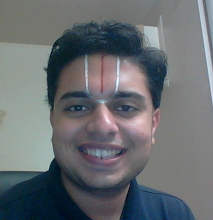In this post-modern era, when everyone is a self-proclaimed victor in any debate, it is the art of debate itself which is at dire straits. It is the logic (very often the lack of it) that hurts (rather is hurt) the most; In that, it will be amusing to observe how people manage to come up with the most inappropriate (and impossible) examples.
One of my friends, who is so fond of being the devil's advocate, often brings up a thought and asks for others' opinion on them (Simple'a solla pona.... Pesa vittu vedikka paakkardhu :P ); Recently he braught me a topic about love, and stated an example "Assume that an eighteen year old guy falls in love with a ninety year old woman" (now don't try imagining motherly, or grand motherly or platonic - he meant the popular romantic sense of it). Abstraction is indeed a worthy dimension towards understanding things, but these kind of examples run it to ridiculous limits. It is something like "assume 1=2 for the time being"; If I was to protest, the response would be "just assume - u need not accept".
Though old Indian schools had comprehensive grammar for logic, reasoning and debate, and several learnings associated with them, time and again people were coming up with arguements of the kind above. It is a popular reference in many refutations to such (worthless) arguements using one 'good old' and 'popular' example - Musalakisalayam.
Musalakisalayam literally means offspring of a metal staff (the long cylindrical rod which is used to crack paddy in a stone drum - Ollakkai kozhundhu in Tamil). "Olakkai Kozhundhu" is a word used to call someone an Idiot; but the original usage was to challenge someone who generalises a logic to inappropriate ideas. If one were to ask how an offspring of the metal staff will look like, if the response to come was that it would be like the same staff but smaller in size, then you are in deep trap, because one can never assume things which he has never known or seen. (eg. - form of a tadpole is never even close to a frog).
The same Musalakisalayam had a significant role to play in my dear Srirangam, sometime in the early 13th century when a modest cook was working in the house of a great Master. One early morning in the Master's drawing room, a few scholars were discussing some Sastra-vishayam, and our Cook was intrigued though he hardly understood a word. He managed to ask one of them - what they were discussing about. One arrogant scholar responded that they were discussing about Musalakisalayam - mocking at him that he is so illiterate. Our Cook still couldn't get the mockery, was patiently sitting by the side, listening to them; and eventually was running late for his daily errands. Since he was late in getting the meal ready, his master asked him for the reason, he told the story and his interest in learning the Musalakisalaya-Tattva. The Master was grief-stricken by the attitude of the scholars towards his servant, as he had high regards for the sincerity of his Cook. He began teaching his Cook as his prime student from that day, and our friend learnt so well that he graduated to the capacity of becoming a Jeeyar to serve Sri Ranganathan and Lord Varadarajan in the name of Vadikesari Azhagia ManavaLa Jeeyar, whose sishya parampara are still serving the Kanchi Perumal Koil Jeeyar Mutt.
Adding to this, HH VAMJ wrote a book (Vaadha granta) called "Musalakisalayam" apart from the most celebrated 12,000 padi vyakyanam for Baghawad Vishayam, Tatva deepikai and Deepaprakasa. And before I forget, the 'Master' we have just seen was none other than Sri Krishnar or popularly known as the Vyakyana Chakravarthy HH Periyavachan Pillai.
Though we are not qualified enough to read Vaadha grantas of our poorvacharyas, and not even fit to learn Tarka Sastra (art of Debate) according to the protocol, atleast we shall try to listen to the learned elders and start talking sense instead of fooling around being a Olakkai Kozhundhu.

